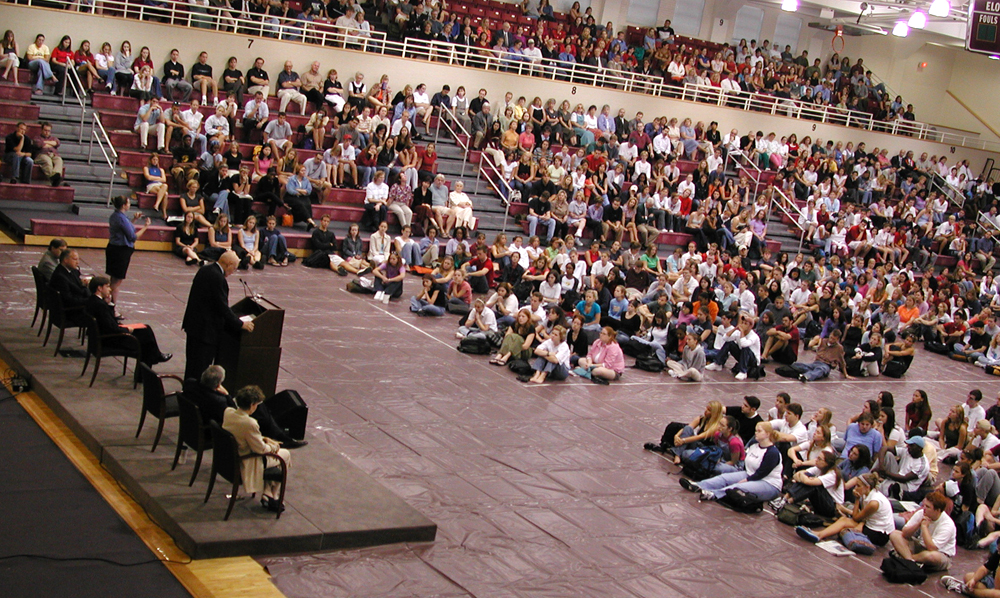On Sept. 12, 2001, more than 1,000 students, faculty and staff gathered in Alumni Gym following the terrorist attacks in New York and Washington, D.C. to share their thoughts and reflect.
Just 24 hours after two planes hit the twin towers of the World Trade Center, a third hit the Pentagon and a fourth plunged into a field in Pennsylvania on a September morning in 2001, more than 1,000 Elon students, faculty and staff filled Alumni Gym to share their thoughts and feelings about these devastating terrorist attacks.
Led by then-President Leo M. Lambert, the Sept. 12, 2001, gathering offered an opportunity for members of the campus community to try to begin processing the impact of the attacks on the country and its people, and to grieve the thousands of lives lost.
“It brought everybody together in a time of prayer that was needed,” Barry Collins, a senior from Stewart, Virginia, said at the time following the gathering. “It let everyone experience their feelings as a community.”

Nineteen years have now passed since the attacks, with the university recognizing and remembering that horrific day and those killed in various ways through the years, including fundraising efforts and ringing the bells in Alamance Building. This year as in years past, members of the Student Government Association placed American flags around campus to mark the somber anniversary.
On that September morning the day after the attacks, Lambert recognized the far-reaching and longstanding impact the attacks would have on the country. “America will be different because of what happened,” Lambert said. “I hope we will better understand the causes of the deep-seated hatred that resulted in this tragedy. I hope we will think carefully about not surrendering our free and open society bit by bit because of terrorism. I hope we will continue our journey toward that more perfect union that the founders intended.”
The late President Emeritus J. Earl Danieley offered a historical perspective, drawing from his experiences on campus during the attack on Pearl Harbor in 1941 and his service as president of Elon during the Vietnam War.
“Whatever has happened to our community and to our nation, we have always stood together,” Danieley said. “We are profoundly shocked and deeply saddened by the monstrous evil which struck, an unwarranted and dastardly blow against the United States … but in the midst of our anger, our grief and our sadness, I stand before you to remind you that it has always been the Elon way to rebuke evil, to stand for freedom and justice, and to move forward in unity as one great family.”

It was Professor John G. Sullivan who set the scene for the crowd from just 24 hours before, when members of the campus community had been gathered around Fonville Fountain for College Coffee. The football team and coaches had been gathered, with the marching band playing and coming across the quad.
“Sun shining. Blue skies,” Sullivan recalled. “Americana in pure form.”
That’s when news of the attacks hit campus. Sullivan said he left from there for his 10:30 class called “Dante’s Journey,” with students slated to begin Dante’s great poem, the “Divine Comedy,” that very day, and follow the literary journey into hell. Sullivan noted the irony, given the hellish landscape that Manhattan had become, and the choices that lay before the country about whether to give into hatred when faced with such evil.
“The larger lesson is this — one truth we humans should have learned by now,” Sullivan said. “The simple truth is this: hate is never overcome by hate. Strange as it seems to so-called realists of any age: hate is only overcome by love. Only overcome by love.”
He reminded the crowd that after his descent into hell, Dante would then rise from those depths, and emerge, as detailed in the last line of the great work, “to look once more upon the stars.”
“May our journey lead us — as Dante’s did — from dark wood to White Rose, from our potential for violence and ignorance and cruelty to our potential for living a larger life and following a higher way. In all this, may we who companion one another be moved by love, by the great love that overcomes hate, by, in Dante’s words, ‘the love that moves the sun and other stars,'” Sullivan said.

SGA President Trey Bolton would also reflect back to standing around Fonville Fountain the day before, talking about the upcoming grand opening ceremonies for Rhodes Stadium, when the news hit. “This event will forever be a vivid memory especially for our generation,” Bolton told the crowd. “Yesterday on our campus there was a silence, a quiet mourning, as we struggled to learn and come together with our thoughts. We gathered in groups and gained comfort and strength from one another. We, as individuals, will identify these moments and forever remember where we were, what we were doing, who we were with.”
Following remarks by Counselor Gina Collins, Chaplain Richard McBride concluded the gathering with a moment of prayer, noting before the closing prayer that “we must approach this tragedy by acknowledging that the seed of evil is in our spirits, and it is up to us to choose to respond to that with a choice that leads us to the light and not the dark.”



